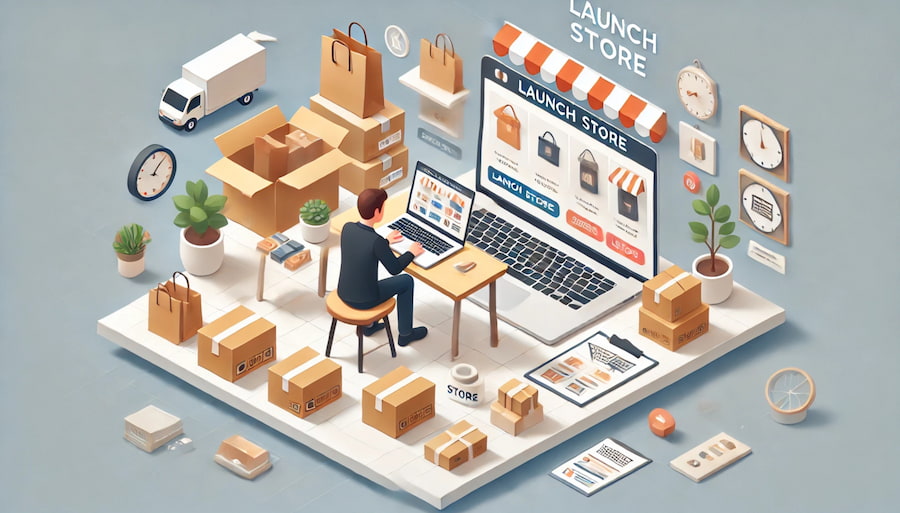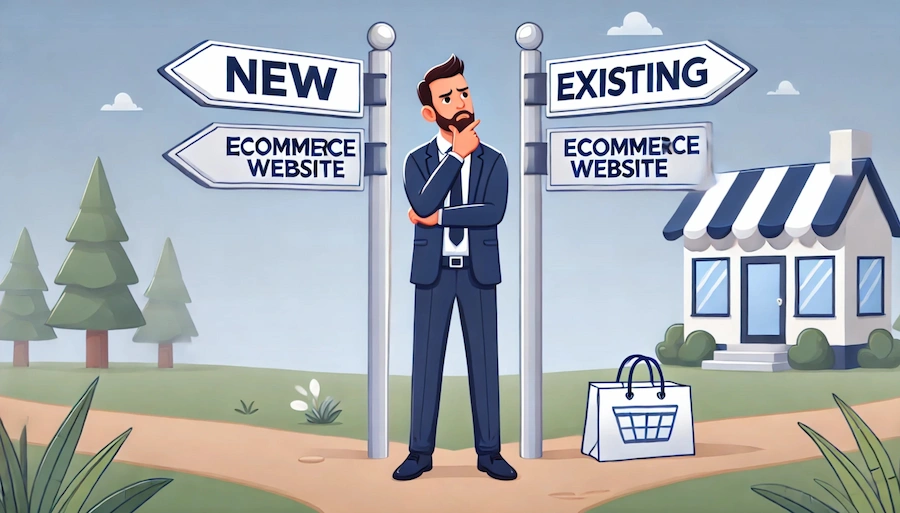Starting a business online may feel like biting off more than chew, but it’s really not as daunting as you think. Global ecommerce sales reached $6.5 trillion in 2024, a clear indication of the market’s rapid growth.

With a projected 15% growth rate in online sales in the next five years, North America alone contributes a significant portion of market share.
By 2030, ecommerce business is expected to account for nearly 30% of all retail sales worldwide. Those numbers don’t just prove the potential of this industry; they prove that it is a successful business model in this day and age. Ever wondered, “Should I start an ecommerce business?” The answer is a big, enthusiastic yes—and I’ll show you why.

The Thrill of a Fresh Start an Ecommerce Business
There is something incredibly exciting about starting an ecommerce business. Imagine stepping onto a blank canvas with endless opportunities to create your masterpiece. Ecommerce allows you to reach customers worldwide without leaving your home. It’s so different from the traditional brick-and-mortar businesses that we’ve known in the past, which is why it’s grown so popular especially among the younger generation of aspiring entrepreneurs.
Here’s the kicker: Over 90% of internet users are making online purchases in 2024. That’s like having millions of potential customers right at your fingertips! This year, mobile commerce (shopping on smartphones) will generate nearly $4.5 trillion in sales worldwide, proving that more people than ever are shopping from their couches. Social commerce platforms, such as Instagram and TikTok, help businesses generate billions of dollars every year.
Start an Ecommerce Business: Where to Begin
One of the most exciting ventures you can embark on is starting your own e-commerce business. No matter if you’re a newbie or have some entrepreneurial experience, it’s a free market with room for all. A simple idea could be the key to starting any successful business-, but you might be wondering, “where do I begin?” From picking the right niche to building your brand, we will break it all down for you in this section. Ready to dive in? Let’s get started!
1. Choosing the Right Niche
Choosing your niche is like choosing a party theme – it sets the tone and attracts the right audience. Passionate about tech gadgets? Obsessed on sustainable fashion? Whatever gets you going, concentrate on that. Well-chosen niches make your business more fun and help you stand out in a crowded market.

Plus, niche products often attract highly loyal customers who are willing to pay a premium.
2. Mapping Out Your Plan
Once you’ve nailed your niche, it’s time to map out your business plan. Having a roadmap with milestones will save you a lot of headaches later on. The business plan should include information about your target audience, product pricing, marketing strategy, and financial projections. Think of it as your success blueprint.
3. Setting Up Shop
The next step is setting up your online store and creating an engaging marketing strategy. With customizable templates, secure payment gateways, and built-in analytics tools, platforms like Shopify, Amazon, and Etsy streamline the process. The best part? Ecommerce is one of the most flexible forms of commerce. A small business can be started with minimal costs and grown over time.

You can learn how to start an ecommerce business without money here.
Besides, who doesn’t love the idea of working from home?
4. Building Your Brand
Your brand is your business personality. From your logo and website design to your tone of voice on social media, you should reflect the values of your company. Choosing earthy tones, green imagery, and emphasizing waste reduction would be appropriate branding for eco-friendly products. Posh brands could choose decorative design elements and include marbled patterns or gold as accent colors.

Explaining the values hidden behind your services or products could also allow your customers to understand what your brand stands for.

Should I Start an Ecommerce Business?
With the rise of online shopping and the steady growth of the industry, this is a great time to be in the industry. If you’ve ever dreamed of owning your own business, now is the time. Here are some reasons why ecommerce could be your ticket to success.
Low entry barriers
Entrepreneurship is like having training wheels. Over 85% of North American internet users have made an online purchase in the past year. You have a ready-made audience just waiting for your products.

With ecommerce sales in the U.S. expected to grow by nearly 14% annually, the possibilities are endless.
My Personal Experience
Based on my personal experience, ecommerce offers a lower barrier to entry than traditional businesses.

Having no physical storefront means fewer overhead costs is a big plus, and managing overhead costs is far easier.
Taking the leap is the hardest part! If you’re on the fence, let me tell you-take the leap. Remember – nothing ventured, nothing gained!
The first time I launched an ecommerce business will always be a memorable experience for me. After a few months, I was selling out of stock regularly, and my living room became a mini-warehouse. Yes, it was chaotic, it was also one of the most rewarding chapters of my life.
Why Flexibility Matters
The freedom that ecommerce offers is unrivaled. No matter where you are in the world, you can run your business from your living room, a beach in Mexico, or a cozy coffee shop in New York. Flexible options like this is priceless. A few years ago, I packed up my laptop and managed my store while on a road trip across the country. I traveled during day, worked a few hours just before going to bed. I could not believe how liberating ecommerce could be.
How Much Does It Cost to Start an Ecommerce Business?
So heere’s the real question: What does it cost to start an ecommerce business? Good news is that you don’t have to rob a bank. With $500 to $1,000, you can cover the basics such as website hosting, domain names, initial inventory, and some marketing. Let’s break this down further:
Key Expenses to Consider
- Website Hosting and Domain Name: Expect to pay around $10 to $20 per month for hosting and $15 for your domain annually.
- Ecommerce Platform: Platforms like Shopify charge $29/month for their basic plan, while WooCommerce is free but may require some add-ons.
- Inventory: If you’re stocking products, your costs will depend on your niche. For dropshipping, inventory costs are nearly zero.
- Marketing: Plan to spend at least $100 on initial marketing campaigns, such as social media ads or influencer collaborations.
Your approach will determine the exact cost. For instance, since dropshipping doesn’t require keeping stock, you may have no upfront costs. However, creating your own product line might require a little more money for manufacturing and packaging. My advice? Start small, then reinvest your profits as you grow. It’s all about the baby steps.
How Long Does It Take to Start an Ecommerce Business?
Trying to figure out “How long does it take to launch an ecommerce store”? The truth is that you can launch your store in just seven days. That’s right, one week! The following is a day-by-day timeline to help you:
Day 1: Setting the Foundation
- Choose your niche and product offerings.
- Research your audience and competitors.
- Pick your ecommerce platform (Shopify, Wix, or WooCommerce) and secure a domain name.
Day 2: Building the Basics
- Set up your website structure and navigation.
- Design your website using customizable templates.
- Add your logo and branding elements.
Day 3: Adding Products
- Upload product listings, complete with descriptions and high-quality images.
- Organize products into categories for easy navigation.
- Set up secure payment gateways and shipping options.
Day 4: Marketing Prep
- Develop your marketing plan, including social media strategies and email campaigns.
- Create social media accounts for your store and start generating buzz.
- Test your website to ensure everything is running smoothly.
Day 5: Pre-Launch Testing
- Perform a soft launch with friends or family to gather feedback.
- Double-check your product pages, checkout process, and contact forms.
- Adjust any design or functionality issues based on feedback.
Day 6: Launch Announcement
- Announce your store’s launch date on social media.
- Schedule promotional emails to go out to your list.
- Set up limited-time offers or discounts to attract early customers.
Day 7: Launch Day
- Officially launch your ecommerce store and share it widely on all platforms.
- Monitor your traffic and sales using tools like Google Analytics.
- Interact with customers and respond to inquiries promptly.
Of course, this time line works if you’re prepared and ready with all the documents. Fine-tune your strategy and make sure everything is in place now to avoid headaches later.

A successful e-commerce business takes time, not a sprint.
Building Momentum
Setting up your store might take a week, but building momentum requires consistency and time. In order to grow your business, you’ll need to drive traffic to your website, engage with customers, and optimize your product listings. A tool like Google Analytics can help you track your progress and identify areas for improvement. Trust me, it’s worth every step.

Ecommerce State: Best for Starting a Business
Did you know that start-up ecommerce businesses can benefit greatly from the state in which they are located? Some states that offer perks that make them stand out among the others when it comes to running an online store.
Tax-Friendly States
True story. Take Delaware as an example. It’s a great place for businesses looking to save money since there is no state sales tax. In addition to their pro-business policies, Nevada and Wyoming have low taxes, making them a to-to states for ecommerce businesses.
For a buzzing entrepreneurial vibe, California or Texas are your best bets. California is a tech powerhouse with a wealth of ecommerce resources, such as mentoring programs and accelerators. In 2024, California will account for more than 45% of U.S. ecommerce businesses, a testament to its thriving startup ecosystem. So it’s no surprise that Texas is always ranked among the top states for small businesses because of its massive customer base and low taxes.

In 2023 alone, more than 50,000 ecommerce startups launched in Texas, an increase of 14% over the past two years.
States with Thriving Business Ecosystems
The affordability of Florida and Tennessee is pretty hard to beat. Here’s a heads up: Florida’s population grows from 22 million in 2024 to over 29 million in 2050. As a retirement and tourist hotspot, the state has also seen a 10% increase in ecommerce revenue year-over-year. That is some crazy population growth if you ask me. Despite Tennessee’s slow adoption of ecommerce, it has low living cost, which could be a huge advantage for business owners who want to cut cost.

Mobile commerce was the leading driver of ecommerce sales in Tennessee in 2023 by up 12%.
At the end of the day, the best state for starting an e-commerce business really depends on your priorities. It’s important to choose the right state for your business, whether you’re looking to save on taxes, tap into a big customer base, or find a supportive community.
Best Way to Start an Ecommerce Business
Imagine knowing what you’re getting into with detailed metrics like traffic, revenue, and audience insights. Business trading platforms like Gruuz makes ecommerce easier by providing tools and transparency to help you evaluate every opportunity. Whatever your goals are, Gruuz makes it easy to find a business that aligns with them.
Why Choose Gruuz?
With Gruuz, you can skip the messy setup phase of starting an ecommerce business. Gruuz provides a marketplace of already established ecommerce businesses for sale to simplify the process.

Businesses like these have established customer bases, proven products, and steady revenue streams.
It’s like hopping into a car that’s already fueled up and ready to go.
1. Transparency and Tools
Using Gruuz, you’ll be provided with detailed metrics such as traffic, revenue, and audience insight. Additionally, they can assist in optimizing your newly acquired business, ensuring a seamless transition. In my experience, Gruuz is the ultimate cheat code for buying an ecommerce business.

By using it, you’ll be able to focus on growing your venture without wasting time, effort, or guesswork.
2. Success Guided by Experts
Their expert guidance ensures you hit the ground and running. When it comes to buying an ecommerce business, Gruuz is a game changer. By starting over, you can save time, eliminate stress, and just focus on scaling your business!
3. Why Gruuz is a Game-Changer
Gruuz eliminates many hurdles that people go through when starting a business from scratch, like figuring out the product-market fit. Besides being user-friendly, their platform has transparent pricing and support at every stage.

Conclusion
Online shopping industry is booming, and now is the perfect time to get started. Now that you know what you need to do, what are you waiting for? Start your ecommerce journey today! If I had to start over, I’d go with Gruuz every single time.
FAQs
Q. How to Start an Ecommerce Business Easily?
Buying e-commerce websites for sale from Gruuz is the best way. Alternatively, it’s easy to set up a professional-looking site with platforms like Shopify and Wix.



